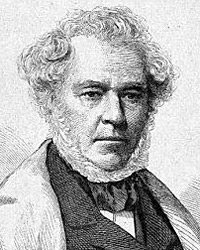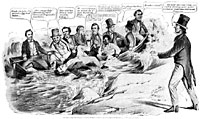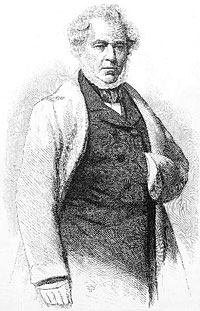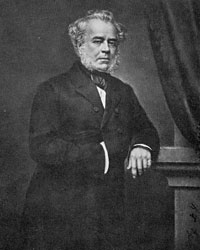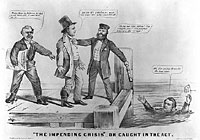
The Impending Crisis
New Your Couriet & Enquirer
James Watson Webb had a big ego and a bigger temper. Historian Jerome Mushkat called Webb a “quick-tempered, haughty martinet.”1 “In Paris and Rio de Janeiro, on land or sea,” wrote Lincoln biographer Carl Sandburg. Webb “believed that Lincoln should have appointed him major general, rating himself a grand strategist, having fought white men in duels and red men in frontier war.”2 Webb had been a powerful voice in Whig and Republican politics for more than three decades. He was rewarded for his Republican loyalties with an appointment by President Lincoln as U.S. minister to Brazil. It was his second ambassadorial appointment, but the earlier one — as Minister to Austria by President Zachary Taylor in 1851 — had not been confirmed by the Senate. In their disappointment over a failed patronage appointment with the Taylor Administration, Webb and Mr. Lincoln had a common bond — Mr. Lincoln had unsuccessfully sought to be named head of the federal Land Office.
The Lincoln Administration appointment was made after his newspaper, the New York Courier and Enquirer, was merged with the New York World in 1861. Ironically, the merger stilled one of the city’s Republican newspaper voices which Webb had originally created in 1829 at age 27. He merged the Morning Courier with the New-York Enquirer — making a paper with strong Jacksonian Democrat credentials. Later, Webb’s orientation turned to the Whig Party. The paper also reflected Webb’s political loyalty; he had taken his paper from dedication to Jacksonian Democracy to the Whig tradition to the nascent Republican Party. Webb supported nativism in the mid-1830s, attacking the links between Tammany Hall and foreigners who exercised “a blind and passive obedience to an ambitious Priesthood.”3 By 1862, The World had once again become a banner Democratic daily.
Time had passed by the Courier and Enquirer. New Yorkers preferred the cheaper and more colorful newspapers such as the New York Herald. The “Courier and Enquirer was a Wall Street paper. It catered to mercantile interest, to finance, and to shipping, and editorially it voiced the conservative views of the merchant class,” wrote Francis Brown in Raymond of the Times. “At the Courier‘s masthead appeared the legend, ‘By J. Watson Webb,’ and though the words were misleading, they told that the Courier was definitely Webb’s paper. When eventually he disposed of the property after years of ownership, he asserted, with considerable exaggeration, to be sure, that he had always been ‘the sole and only responsible editor.'”4
Webb was a colorful editor in a city with a colorful newspaper tradition. “It is part of our national history that editors of that era took themselves and one another seriously. The pen was a lance, the sheet a shield, behind which they jousted merrily on what were not always mimic fields,” wrote historian Don C. Seitz. “James Watson Webb, of the horrendous Courier and Enquirer, who was a good deal of what was known in that day as a ‘lady-killer’ and Beau Brummel, sneered editorially, for example, at Greeley’s ill-worn clothes. Just before indulging in this persiflage, Webb had been indicted, convicted and sentenced for acting as a second to Henry Clay in a duel with Tom Marshall. The term of duress was two years in Sing Sing, but Governor William H. Seward pardoned him before he went behind the bars, in return for which Webb named one of his second-growth sons William Seward Webb, a name that sticks in the family, implying relationship rather than gratitude. The pardon incident gave Greeley a fine chance. He had worn, he observed, better clothes than Webb could wear if he paid his debts, and further: ‘That he ever affected eccentricity is most untrue; and certainly no costume he ever appeared in would create such a sensation in Broadway as that which James Watson Webb would have worn, but for the clemency of Governor Seward.”5
Understandably, Webb was a major supporter of Seward’s presidential candidacy in 1860 — travelling to Chicago to work with fellow Republican editors Thurlow Weed and Henry J. Raymond. According to historian James A. Rawley, Webb “urged [Republican National Chairman Edwin D.] Morgan to issue a statement that New York could not be carried for any candidate but Seward. ‘Suppose I should make the statement that you urge me to make,’ the chairman is said to have replied, ‘and suppose another candidate than Mr. Seward should be nominated by convention; would not an influential paper like The Albany Argus say ‘Governor Morgan says the Republican candidate cannot carry the State of New York! What a position the course you propose would put us all in!'”6
After Seward lost, Webb and Raymond stopped back in Auburn, New York to meet with Seward. Seward biographer Glyndon Van Deusen wrote: “Mingled with Seward’s dejection there was also bitterness. Nothing else can account for the blunder he made about [Horace] Greeley. Weed had written that the Tribune‘s editor had acted both malignantly and unscrupulously at Chicago, and just as this letter arrived Raymond and Webb appeared at Auburn on their way back from the convention. They brought news of the desperate illness of Seward’s close friend [John L.] Schoolcraft, who had gone to Chicago a sick man and as a result of his efforts there, was now near death.”7 After a discussion in Auburn of the long history of the Seward-Weed-Greeley relationship, Webb joined Raymond in lambasting Tribune Editor Horace Greeley for undermining his candidacy. Webb wrote that Greeley was a “viper” who had betrayed the loyalty and favors given him by Seward. Greeley, wrote Webb “used the life and power thus bestowed, to sting to death his benefactor and confiding friend.”8
After the election, Webb turned his sights on a patronage position for himself. Seward biographer Glyndon Van Deusen wrote: “James Watson Webb, an inveterate beggar for office, wanted a diplomatic appointment that would be lucrative. William M. Evarts wrote to Lincoln on Webb’s behalf, urging that he be made Minister to Great Britain and intimating that, if Frémont or Seward had become President in 1856, Webb would have received that post. In 1861 the editor of the Courier and Enquirer was willing to settle for something less. He badgered Seward, appealed from him to Lincoln, and was finally made Minister to Brazil.”9
“Having sold his New York newspaper, the Courier and Enquirer to the New York World, James Watson Webb meandered into Lincoln’s office; the least he could ask for would be a commission as major general,” wrote Lincoln biographer Carl Sandburg. Decades earlier, Webb had been appointed as a second lieutenant in the Army by then Secretary of Secretary John Calhoun. “Webb, however had been ranked as major general in New York when serving as engineer in chief of the State, and now insisted that Lincoln should make him a major general of volunteers. He went away; Lincoln considered, sent Webb a commission as brigadier general, and got the commission back in the mail next day with Webb’s notation: ‘Respectfully declined.’ Seward then sent to Webb an appointment as Minister to Turkey, which came back with Webb’s notation: ‘Respectfully declined.’ Seward tried again with an appointment as Minister to Brazil. This Webb accepted, though saying he would go to Brazil via Paris and dine with the Emperor Napoleon III.”10
Webb did go to Paris and at President Lincoln’ suggestion asked Napoleon to obey the Union blockade of the confederacy. Napoleon replied: “Tell the President that France will recognize the blockade.”11 Several years later, Webb helped negotiate with Napoleon for the withdrawal of French troops from Mexico. By 1868, Webb’s role in the affair brought him into conflict with Seward, according to Seward biographer Glyndon Van Deusen:
Webb was declaring to all and sundry that he, rather than Seward, should have the credit for inducing Napoleon III to leave Mexico. He asserted that in 1863 he had prevailed upon the Emperor to agree to the withdrawal of his troops; it was due to him that Napoleon had arranged for their periodic withdrawal. Webb took the documents in the case to Raymond, who supported him in a leading editorial in the Times.
The evidence did indicate that in 1865 Webb had suggested the withdrawal in stages of the French forces. It also showed that in 1863 Napoleon had told Webb that he would retire from Mexico only when he could do so with credit and honor, and that he would not leave under compulsion. This was scarcely the same thing as an agreement to abandon the Mexican venture. Bigelow was indignant with Webb, who owed much to Seward; but Seward remarked that the General probably thought that airing his claim would be of value to himself and would not hurt his former chief.12
Although the sun set slowly on Webb’s newspaper career, he had helped encourage the careers of two other powerful editors. In 1829, James Gordon Bennett had become Associate Editor of The Courier and Enquirer, which Bennett’s biographer, Don C. Seitz, described as “a sort of New York Thunderer for thirty years, under the headship of the blustering Webb.”13 Bennett had left the Courier and Enquirer in 1832 when James Webb shifted from a pro-Jackson to an anti-Jackson policy. But that did not end their association. Webb wrote of one encounter in the spring of 1835: “As I was leisurely pursuing my business yesterday in Wall Street…James Watson Webb came up to me on the northern side of the street — said something, which I could not hear distinctly, then pushed me down the stone steps leading to one of the broker’s offices, and commenced fighting with a species of brutal and demoniacal desperation, characteristic of a fury. My damage is a scratch, about three-quarters of an inch in length, on the third finger of the left hand, which I received from the iron railing I was forced against, and three buttons torn from my vest, which my tailor will replace for a sixpence. His loss is a rent from top to bottom of a very beautiful black coat that cost the ruffian forty dollars, and a blow in the face that may have knocked down his throat some of his infernal teeth, for anything I know. Balance in my favor, thirty-nine dollars and ninety-four cents.”14
At a later date, another future New York City editor, Henry J. Raymond, joined Webb’s newspaper staff. “James Watson Webb, editor and chief owner of the Morning Courier and New York Enquirer, had been for fourteen years, when Raymond joined his staff in 1843, one of the most colorful figures in New York newspaperdom,” wrote Raymond biographer Francis Brown. “A tall, handsome, massive sort of man, a striking figure in any company, he had been called the ‘Apollo of the press.’ In his youth, he had fought Indians — his father had been an aide to Washington — and most of his life he answered to a military title, lieutenant, colonel, and ultimately general. Bennett, who had been his partner, described him as ‘a frank, manly blackguard, a fine-looking, burly, honest kind of savage,’ and admitted that in private life Webb was a gentleman. Webb characterized himself as ‘the best abused personage connected with the American press.”15
“In 1850, General Webb went to Europe and left Raymond in temporary charge of The Courier and Enquirer,” wrote New York Times historian Elmer Davis. “Raymond not only failed to use his political influence to promote Webb’s brief Senatorial boom, but incurred his chief’s disfavor by speaking out some plain truths on the slavery question in connection with the compromise proposals of that year. Raymond was not then, and never was till well along in the Civil War, an abolitionist; but he did not think that the more urgent question of the slave power in politics could be cured by ignoring it or by tame surrender. His independence got him into Webb’s bad graces, and when Raymond went to Albany for the legislative session that winter he was eager to get away from Webb and start out for himself.” The result was Raymond’s determination to leave Webb’s employ and start a new newspaper. 16
Raymond biographer Francis Brown suggested that policy differences were key: “Although under Raymond’s direction the Courier had made handsome profits, equal to those of any other journal in the city, the Herald alone excepted, Colonel Webb now told Raymond that he disapproved of the paper’s editorial position during his absence in Europe. He disapproved even more the stand Raymond was taking at the moment — ‘imbued with anti-slavery doctrines,’ Webb described it — and with his own hand he revised the last editorial Raymond wrote for the Courier. Raymond believed that his failure to further Webb’s senatorial ambitions was not unrelated to the Colonel’s attitude, but whatever the cause, the two men had reached the breaking point….Under ordinary circumstances the separation might have been friendly, for Webb had often expressed high regard for Raymond’s abilities. Instead, they parted in bitterness and anger and insult.”17
But politics brought Webb and Raymond back together in 1860 behind the nomination of William H. Seward and the election of Abraham Lincoln. Necessity eventually reversed their roles. By 1866, noted Raymond biographer Brown, “General Webb, on leave from his post as minister to Brazil and suffering from gout, presumed on old association to badger Raymond for a new political plum.”18 Webb didn’t get the new job and instead stayed on as a diplomat in Rio de Janeiro.
Footnotes
- Carl Sandburg, Abraham Lincoln: The War Years, Volume II, p. 35.
- Jerome Mushkat, Tammany: The Evolution of a Political Machine 1788-1865, p. 162.
- Francis Brown, Raymond of the Times, p. 44.
- Don C. Seitz, Horace Greeley: Founder of the New York Tribune, p. 12-13.
- James A. Rawley, Edwin D. Morgan, 1811-1883: Merchant in Politics, p. 108.
- Glyndon Van Deusen, William Henry Seward, p. 229.
- Sidney David Brummer, Political History of New York State During the Period of the Civil War, p. 66 (New York Courier and Enquirer).
- Glyndon Van Deusen, William Henry Seward, p. 272.
- Carl Sandburg, Abraham Lincoln: The War Years, Volume II, p. 34-35.
- Carl Sandburg, Abraham Lincoln: The War Years, Volume II, p. 35.
- Glyndon Van Deusen, William Henry Seward, p. 553.
- Don C. Seitz, The James Gordon Bennetts: Father and Son, Proprietors of the New York, p. 24.
- Don C. Seitz, Horace Greeley: Founder of the New York Tribune, p. 52-53.
- Francis Brown, Raymond of the Times, p. 34.
- Elmer Davis, History of The New York Times, 1851-1921, p. 4-5.
- Francis Brown, Raymond of the Times, p. 92.
- Francis Brown, Raymond of the Times, p. 288.
- Jerome Mushkat, Tammany: The Evolution of a Political Machine, 1789-1865, p. 113.






